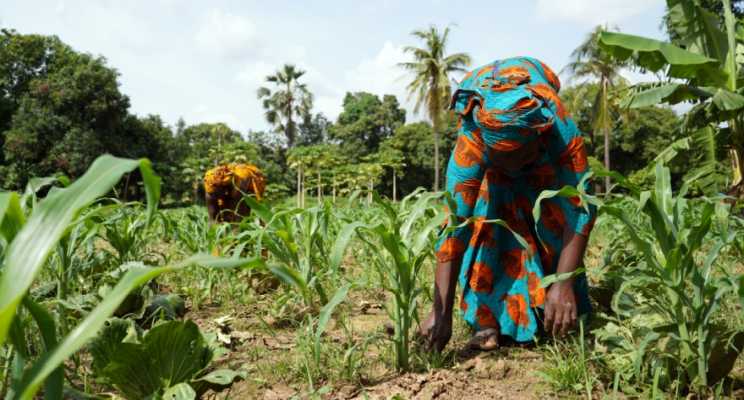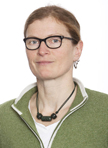
UPSCALE

EU project UPSCALE: More crops without pesticides in East Africa
Cereals such as corn and millet are among the main foods in East Africa. But crops are often threatened by various factors: lack of soil fertility, extended dry periods and pests such as the maize stemborer and the Striga weed often result in smallholder farmers in this region earning low yields and falling below the poverty line. One solution here is the Push-Pull cultivation method, which improves soil fertility and increases crop yields by up to 200% or more, without the use of any pesticides1.
Push-Pull is already successfully practised in East Africa by over 200,000 smallholder farmers, but only on individual fields planted with corn and millet. The aim of the UPSCALE project is to scale up this organic farming method from individual fields to larger agricultural landscapes and regions in East Africa and from cereal to other crops and cultivation systems.
How the Push-Pull cultivation method works
With the Push-Pull technology, the legume Desmodium, planted as an intercrop between the grain rows, repels the stemborer (push) with its smell and suppresses the growth of Striga weed. Napier grass planted around the grain field attracts the stemborer (pull), so that stemborer females prefer to lay eggs on the leaves of the Napier grass. When the resulting larvae penetrate the stems of the grass, it produces a slimy substance that kills the pest. The two intercrops have further useful side effects: Desmodium improves soil quality and Napier grass is a healthy feed for animals.
Women in particular benefit from this simple and environmentally-friendly cultivation method, as they are primarily responsible for field work. The fact that there is no weeding to do not only saves time, but also protects their backs and thereby their health. With the additional feed they harvest via Push-Pull, they can expand or increase their business by keeping cows and chickens. This not only increases milk yield, but also their income. The costs for chemical pesticides and artificial fertilizers are also eliminated. The improved economic situation allows women to send their children to school and also pursue other activities.
Exploiting the potential of the Push-Pull cultivation method
In order to determine which factors contribute to the success of the Push-Pull technology, the consortium has identified five research areas in Ethiopia, Kenya, Uganda, Rwanda and Tanzania. These differ in soil conditions, climate and pest levels.
Fields cultivated with Push-Pull will be selected in each of these areas. At the same time, control fields without Push-Pull will be selected. In close cooperation with local smallholder farmers, the researchers will test under which conditions the Push-Pull cultivation method works best. Which intercrops are climate-resistant? Which plant varieties can be best combined? Can Push-Pull also be applied to fruit and vegetables? How does the surrounding landscape structure and plant diversity affect Push-Pull? The consortium is also investigating the impact of cultural and socioeconomic factors on Push-Pull, such as land ownership structures, access to knowledge and capital and gender roles.
Based on the data obtained, researchers can determine criteria for the successful implementation of Push-Pull in larger agricultural landscapes and regions in East Africa. In order for this to succeed, the knowledge of Push-Pull must reach farmers, the general public and decision-makers. To this end, the consortium organises training days in demonstration fields in cooperation with local farming groups. There, they learn everything about the technology and its methods, share their experiences and deliver important information for further scientific research. UPSCALE aims to increase the number of smallholder farms that already practice Push-Pull by at least 25,000.
To ensure that the successful dissemination of Push-Pull technology does not fail due to the lack and overpricing of seed for Desmodium, the consortium is working together with state institutions to strengthen local seed production and operating systems, alongside the research work.
European and African expertise in the consortium
The UPSCALE project involves 18 partners from four European and six African countries. The consortium consists of partners from research, government, agriculture and NGOs.The EU project UPSCALE was prepared, among others, with funds from the Bavarian funding programme for the initiation of international research cooperation BayIntAn. UPSCALE coordinator Prof. Emily Poppenborg Martin travelled to Kenya to hold talks with representatives of the "International Center for Insect Physiology and Ecology" (icipe) and to better understand the push-pull technology. After signing the Grant Agreement, the coordinator transferred from the Julius-Maximilians-Universität Würzburg to the Institute of Geobotany of the Leibniz University of Hannover. The Bavarian Research Alliance (BayFOR) is responsible for the administrative project management in the project. From November 2020 to October 2025, the UPSCALE project receives EUR 7.6 million funding from the European Union’s Horizon 2020 research and innovation programme. Of this amount, EUR 1.1 million goes to Bavarian stakeholders.
BayFOR@Work
- Intensive, specialist application support
- Proofreading
- Budget calculation support
- Support in grant agreement preparation
- Project management in the ongoing project
------------------------------------------------------------------------------------------------------------------------------
Project Overview
Project aims and fields of work
The aim of the UPSCALE project is to transfer the ecological push-pull cultivation method to larger agricultural landscapes and regions in East Africa and to apply it to other crops and cultivation systems.
- Improving soil fertility
- Increased food security
- Higher crop yields without pesticides
Target groups
The project results of UPSCALE are relevant for various actors, such as NGOs, international organisations or ministries from the following sectors:
- Agriculture
- Climate and environmental protection
- Development cooperation
BayFOR as a partner
The Bavarian Research Alliance supported the project with intensive technical application support, proofreading, budget calculation and contract preparation.
BayFOR is responsible for administrative project management in the ongoing project.
Funding
From November 2020 to October 2025, the UPSCALE project will receive funding of 7.6 million euros under the EU's Horizon 2020 Framework Programme for Research and Innovation under grant agreement No. 861998, of which 1.1 million euros will go to Bavarian stakeholders.
Consortium
In the UPSCALE project, 18 partners from four European and six African countries are working together. The consortium is made up of partners from research, government, agriculture and NGOs. After signing the grant agreement, the coordinator moved from the Julius Maximilian University of Würzburg to the Institute of Geobotany at Leibniz University Hannover.
Coordinator:
Institute of Geobotanya at Leibniz-Universität Hannover
Partner institutions:
icipe - International Centre of Insect Physiology and Ecology
Bayerische Forschungsallianz (Bavarian Research Alliance) GmbH
Eastern Africa farmers federation (EAFF)
Jomo Kenyatta University of Agriculture and Technology (JKUAT)
Kenya Agricultural & Livestock Research Organization (KALRO)
Maseno University (MU)
Food for the Hungry - Nonprofit Organization (FH)
Rwanda Agriculture Board (RAB)
InoSens doo Novi Sad (INOSENS)
University of KwaZulu-Natal (UKN)
Lunds universitet (ULUND)
Sveriges lantbruksuniversitet (SLU)
University of Zurich (UZH)
Tanzania Agricultural Research Institute (TARI)
International Institute for Sustainable Development (ISD)
National Agricultural Research Organisation (NARO)
Julius-Maximilians-Universität Würzburg (UWUE)
Further information
Contact

Prof Dr Emily Poppenborg-Martin
Institute of Geobotany, Leibniz University of Hannover
(previously: Chair of Zoology III at Julius-Maximilians- Universität Würzburg)
Phone: +49 (0)511 762 3634
Email: poppenborg-martin@no-spam-pleasegeobotanik.uni-hannover.de
Contact at BayFOR

Dipl.-Geogr./M. A. Gudrun Lampart
Coordination Funding Programme (BayIntAn)
Phone: +49 89 9901888-190
Email: internationalisierung@no-spam-pleasebayfor.org




